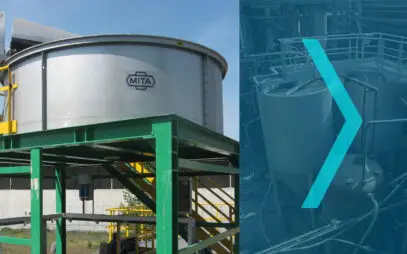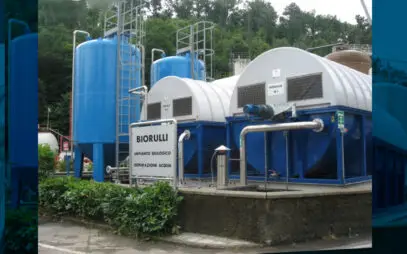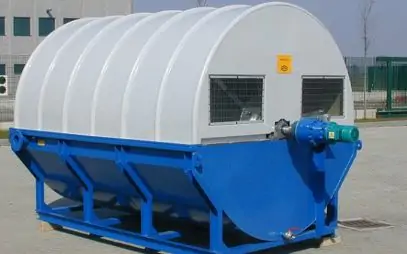Examples of areas: mining companies, refineries and oil processing industries, fuel depots.
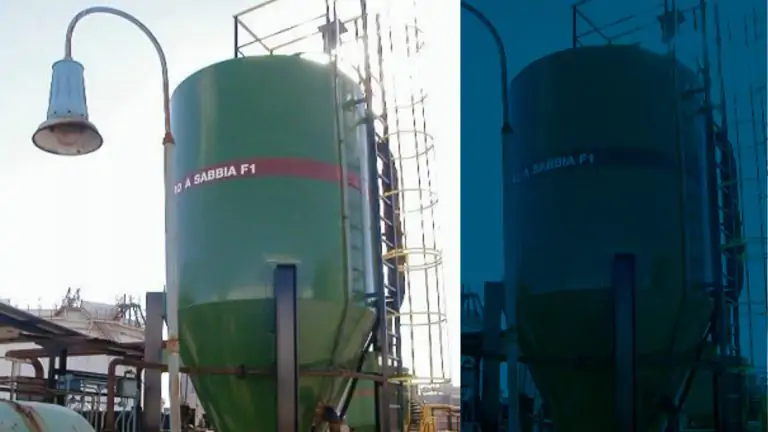
Water Treatment for Oil & Gas
Industrial wastewater from oil & gas is very often rich in oils, phenols, polyphenols and hydrocarbons and therefore needs de-oiling, even upstream of subsequent biological treatment: lamellar pack de-oilers and flotation units are some solutions proposed for the purpose by MITA Water Technologies.
Main requirements: removal of oils and hydrocarbons, separation of processing components (e.g., metals) from water, biological treatment, stormwater treatment, reuse for production processes.
Wastewater treatment systems for oil & gas
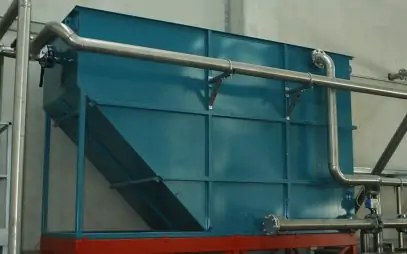
Oilpack Oil Separators Monoblock OM
These one-piece oil separators are designed to separate non-emulsified oils and consist of a containment tank, made of treated and painted carbon steel or AISI 304 stainless steel or stainless steel according to the customer's choice, and a 45° inclined parallel channel lamella pack made of UV-resistant polystyrene. Customizations with special materials are available upon request.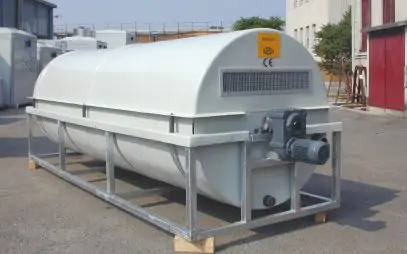
Biorulli® Biological Disc Rotors Monoblock M 115
Efficient, compact, extremely flexible with different pollutant loads: the Biorulli® biological oxidation system, monoblock M 115 series, is ideal for biological water treatment in apartment buildings, villas, small campsites, and factories.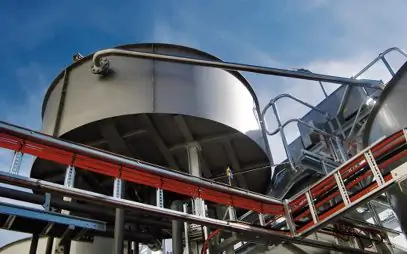
Mitadaf MD Dissolved Air Flotation Units
Mitadaf is the dissolved air flotation (DAF) system developed by MITA Water Technologies. Its outstanding efficiency in separating solids from liquid and thickening sludge comes from a unique approach that combines the use of microbubbles of air, produced by our Mitasat MS, with a uniform effluent hydrodynamic system.Industrial wastewater in oil & gas: characteristics and needs
It may be superfluous to mention how industrial wastewater in the oil and gas industry (and the productions of refineries and fuel depots) is rich in oils, phenols, polyphenols and hydrocarbons: this is true whether we consider production water (e.g., from drilling and production operations), washing water, or meteoric (first rain) water.
Specifically, some examples of pollutants in wastewater from the oil & gas industry can be given (keeping in mind that, as in any other field, each process line is its own species).
- Production processes: oil residues, hydrocarbons, chemicals are often found here.
- Discharges from drilling rigs: drilling mud, hydrocarbons, chemicals are often dominant.
- Discharges from storage and transportation facilities: not only oils and greases, but also sediments of various kinds (such as heavy metals) contaminate the water present at this stage.
Thus we can see how oils and fats are the main component of wastewater from this industry. But not only that.

Water treatment for oil & gas: methods and processes
Of course, methods and processes used in water treatment for oil & gas vary with each individual plant and with the contaminant concentration itself, which is why it is always essential to conduct effluent analysis with pilot units.
Undoubtedly, however, some fairly “typical” water treatment methods can be found.
- De-oiling. This is a process that separates oils and fats from wastewater by taking advantage of the increased gravity of some only components.
- Biological treatment. In this case, aerobic microorganisms (operating in the presence of oxygen) or anaerobic microorganisms (in the absence of that element) work to degrade the organic matter present in wastewater, lowering the BOD and COD component still present in oil & gas industry wastewater.
- Chemical treatment. Chemicals are often required, net of installed technologies, to support contaminants from wastewater.
MITA Water Technologies' solutions for oil & gas wastewater
MITA Water Technologies’ solutions are also designed to meet the needs of petroleum industries, including refineries and fuel depots.
These are some of the technologies successfully used over the years.
- Oilpack lamella-pack oil separators. They are simple and compact systems, ideal for the petrochemical industry especially as a prior to biological treatment: in fact, substances such as oils, phenols and hydrocarbons are likely to inhibit subsequent purification steps if not properly pretreated.
- Biorulli® biodiscs for biological oxidation. They are a reliable, robust and easy-to-use solution that takes advantage of aerobic bacteria (i.e., in the presence of oxygen) to break down organic matter. Specific articles in the literature on the abatement of oils, hydrocarbons and phenols with biological treatment using biodiscs are also well known.This is why the first installations of our system have been carried out in the oil & gas sector and where we have the most references. Both process water (refineries) and storm water, tank drainage and “clearing” water (deposits) are purified in this way. As in most industrial applications, Biorulli® are preceded and followed by other treatment steps.
- Mitadaf dissolved air flotation unit. Compactness, oil or sludge removal efficiency, easy integration into existing systems: Mitadaf is an excellent choice upstream of biological purification systems. In addition, oil depots and refineries are large establishments: the rain and runoff water that falls on their yards is rich in oils and needs treatment by an effective solution like Mitadaf.
- Pile cloth filters. In some cases, when most of the oils and emulsifiers have already been treated, it is useful to leverage the tremendous efficiency of free-fiber cloth filters for the removal of suspended solids-the ideal solution for wastewater finishing, especially for the purpose of reuse within production processes.
Water reuse in the oil & gas industry
As mentioned above, oil depots and refineries are large establishments: the need therefore arises to treat the large amounts of rainwater that fall on the forecourts.
The reuse of process water is a unique opportunity for industries: all sectors are beginning to take advantage of it in terms of optimizing resources and internal processes by managing the water footprint.
Based on its experience, MITA Water Technologies efficiently uses its flotation units and, in some cases, cloth filters to treat and reuse industrial wastewater from the oil & gas sector.
Ask for InformationSome MITA projects
- Industrial Wastewater
- Suspended Solid Removal
- BOD and COD Removal
- Oil and Grease Removal
- Biorulli® Biodiscs
- Dissolved Air Flotation Units
- Continuous Sand Filters
Water Treatment and Cooling Systems for Vedani Group
Various industrial water treatment technologies as well as cooling technologies: since 1995 MITA Water Technologies has provided multiple solutions, together with its "sister" company MITA Cooling Technologies, for the complete water management of Vedani Group, which has been active in aluminum processing since 1982.
Read moreBiological Rotors for the Chemical Company Icap-Sira
High efficiency, ease of installation, and extreme operation-these are the features that a well-known company in the chemical industry appreciated in choosing Biorulli® biodiscs for the biological oxidation of its wastewater. MITA Water Technologies has been cooperating with this industry since 2006.
Read moreBiorulli® Rotating Biological Contactors for ENI
Customization and long-term trust relationship: these are the two variables that decided the award to MITA Water Technologies of the revamping of the water treatment of an ENI depot in Central Italy. Rotary biological contactors, supplied to the company, are simple but efficient devices for COD removal.
Read moreWhat is your process goal?
Tools to help you choose
Industrial and civil wastewater treatment technologies
Our support throughout the product life cycle
A sustainable and efficient solution for every industry and need
Or You Can Choose
Our Newsletter
Sign up for the MITA Water Technologies newsletter: stay up-to-date on systems for municipal and industrial wastewater treatment and filtration.
